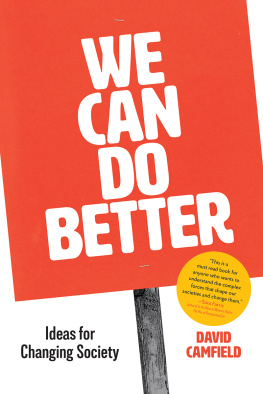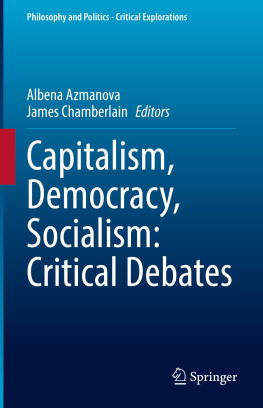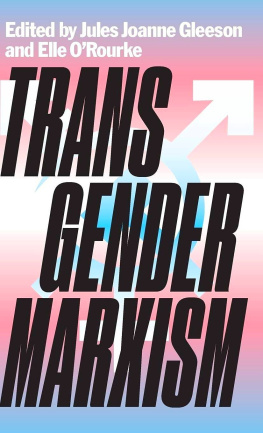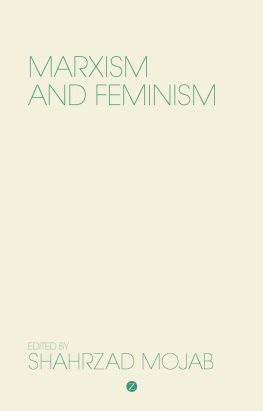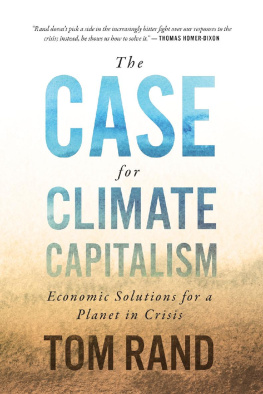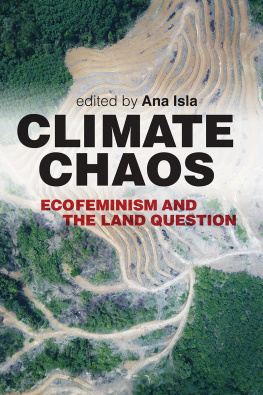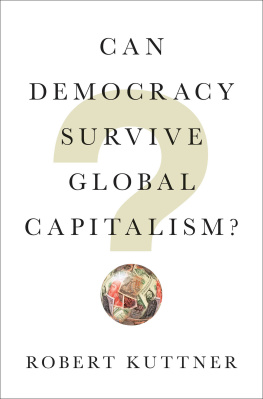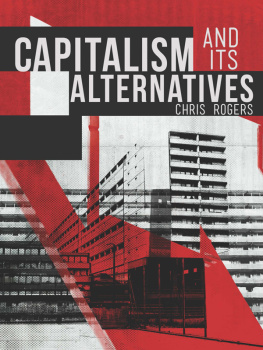WE
CAN
DO
BETTER
PRAISE FOR
We Can Do Better
This valuable book offers a theoretical tool chest for radicals, grounded in activist learning from the past 150 years of struggle yet open to ongoing developments. The development of theory can sometimes be cast as an ivory tower pursuit, outside of, and irrelevant to, activist struggles. This book shows the power of radical theory rooted in activist knowledge in contributing to the development of effective approaches to the struggles of our times.
Alan Sears, Ryerson University
In this book David Camfield sets himself two very ambitious tasks: to refute common idealist misconceptions of social inequalities as peoples own making, and to propose a historical materialist approach that understands the social world as the result of always unequal social and political relations. Camfield succeeds brilliantly on both counts. This is a must read book for anyone who wants to understand the complex forces that shape our societies and change them.
Sara Farris, University of London
Clear, concise and well-argued, David Camfields We Can Do Better offers a powerful critique of our current system and provides hope for a better one. Aimed at newcomers, but rewarding to theoretically sophisticated readers, he relies on a reconstructed historical materialism that integrates the best of Marx and the most important insights of feminist and anti-racist analyses of capitalism, decisively refuting the standard counter-position of class and identity politics. Whether one agrees entirely or not, this is a stimulating contribution to theoretical debates regarding capitalism and strategic debates regarding how we can move beyond it.
Nancy Holmstrom, Rutgers University
With a new generation questioning capitalism and the social oppressions around us, there could not be a better time for David Camfields innovative case for a renewed historical materialism. Taking on some of the most important challenges to anti-capitalism, Camfield makes the case for a radical socialism that is anti-racist, feminist, pro-queer and ecological. In so doing, he powerfully demonstrates that historical materialismif creatively appliedoffers a compelling means to critically understand our world, the better to change it.
David McNally, York University
People who are inspired to change the world in the name of social justice need to cultivate an understanding of how the world works under capitalism. We are in a period of new movements emerging or re-emerging to combat sexism, racism, and myriad of other oppressions, and in the face of ecological crisis and reactionary right-wing movements, the stakes are high. As an introduction to social theory, this book will be especially useful to the activist who has questions about how seemingly separate causes are connected. This book will be a valuable tool in working together for the just society we deserve.
Suzanne MacNeil, President, Halifax-Dartmouth and District Labour Council
WE
CAN
DO
BETTER
Ideas for Changing Society
DAVID CAMFIELD
FERNWOOD PUBLISHING
HALIFAX & WINNIPEG
Copyright 2017 David Camfield
All rights reserved. No part of this book may be reproduced or transmitted in any form by any means without permission in writing from the publisher, except by a reviewer, who may quote brief passages in a review.
Editing: Mark Ambrose Harris
Cover design: Mike Carroll
Printed and bound in Canada
eBook: tikaebooks.com
Published by Fernwood Publishing
32 Oceanvista Lane, Black Point, Nova Scotia, B0J 1B0
and 748 Broadway Avenue, Winnipeg, Manitoba, R3G 0X3
www.fernwoodpublishing.ca
Fernwood Publishing Company Limited gratefully acknowledges the financial support of the Government of Canada, the Manitoba Department of Culture, Heritage and Tourism under the Manitoba Publishers Marketing Assistance Program and the Province of Manitoba, through the Book Publishing Tax Credit, for our publishing program. We are pleased to work in partnership with the Province of Nova Scotia to develop and promote our creative industries for the benefit of all Nova Scotians. We acknowledge the support of the Canada Council for the Arts, which last year invested $153 million to bring the arts to Canadians throughout the country.

Library and Archives Canada Cataloguing in Publication
Camfield, David, author
We can do better : ideas for changing society / David Camfield.
Includes bibliographical references and index.
Issued in print and electronic formats.
ISBN 978-1-55266-996-9 (softcover).ISBN 978-1-55266-997-6 (EPUB).
ISBN 978-1-55266-998-3 (Kindle)
1. Social changePhilosophy. 2. Communism. 3. Feminism. I. Title.
HM831.C36 2017 303.401 C2017-903101-5
C2017-903102-3
Contents
PART ONE
POPULAR BUT DEFECTIVE: THREE SCHOOLS OF THEORY
PART TWO
AN ALTERNATIVE: RECONSTRUCTED HISTORICAL MATERIALISM
PART THREE
ANSWERING SOME OF TODAYS QUESTIONS
PART FOUR
THE POINT IS TO CHANGE IT
Ignore the jailers talk. There are of course bad jailers and less bad. In certain conditions its useful to note the difference. But what they say including the less evil ones is bullshit. Their hymns, their shibboleths, their incanted words security, democracy, identity, civilization, flexibility, productivity, human rights, integration, terrorism, freedom are repeated and repeated in order to confuse, divide, distract, and sedate all fellow prisoners. On this side of the walls, words spoken by the jailers are meaningless and are no longer useful for thought. They cut through nothing. Reject them even when thinking silently to oneself.
John Berger, Fellow Prisoners
We Can Do Better
IN THE RICH COUNTRIES OF the world, where most people reading this book will be, many people feel that their lives are getting harder. Surveys by the Pew Research Center report that since 2008 people in the U.S. have been much more likely to rate their personal financial situation as fair or poor rather than good or excellent.
How do we explain why many people feel that life is getting harder? Is this just the whining of entitled Millennials, as some pundits claim? Are bad things happening to people because of their negative ways of thinking and acting, as advocates of positive thinking would have it? If changes in the world really are making life tougher for many, is that because governments have been spending too much and interfering with free markets? That is what many economists believe. Or is capitalism itself the root cause of unemployment, increasingly insecure and stressful jobs, growing personal debt, deteriorating public services and other developments that make life harder, as the systems critics argue?
The answer to the question why do many people feel their lives are getting harder? is not obvious. This is because how societies work is not self-evident. Societies are complex, and appearances can be deceiving. It is a bit like how the sun seems to revolve around the Earth but, as the scientist Nicolaus Copernicus demonstrated in the 1500s, in fact the Earth revolves around the sun. We know what we experience personally, of course. But to explain the forces that shape our personal experiences we need to understand things that we do not experience directly or transparently.
To explain why many people feel that life is getting tougher and understand many other things in our lives that often appear random or just the way things are, we need ways of thinking systematically about what societies are and how societies work. In other words, we need social theory.

